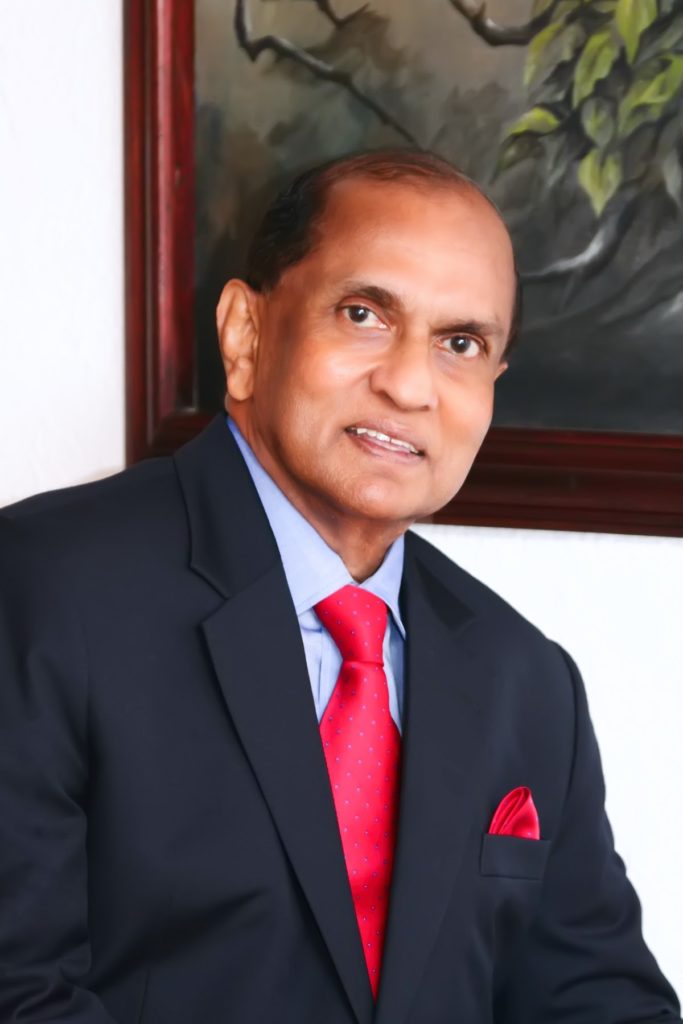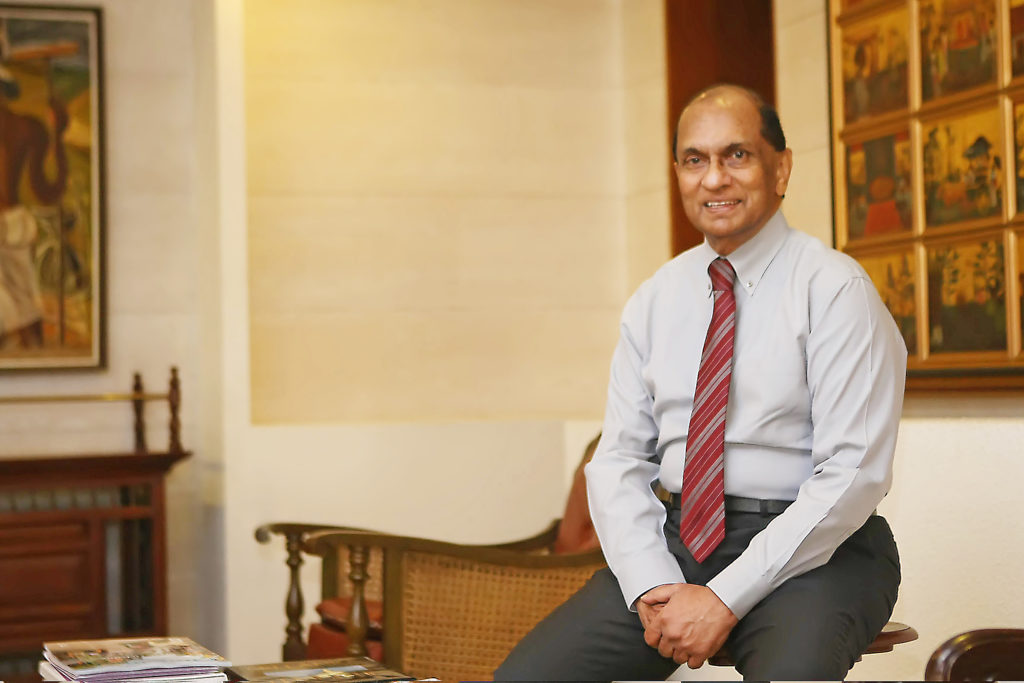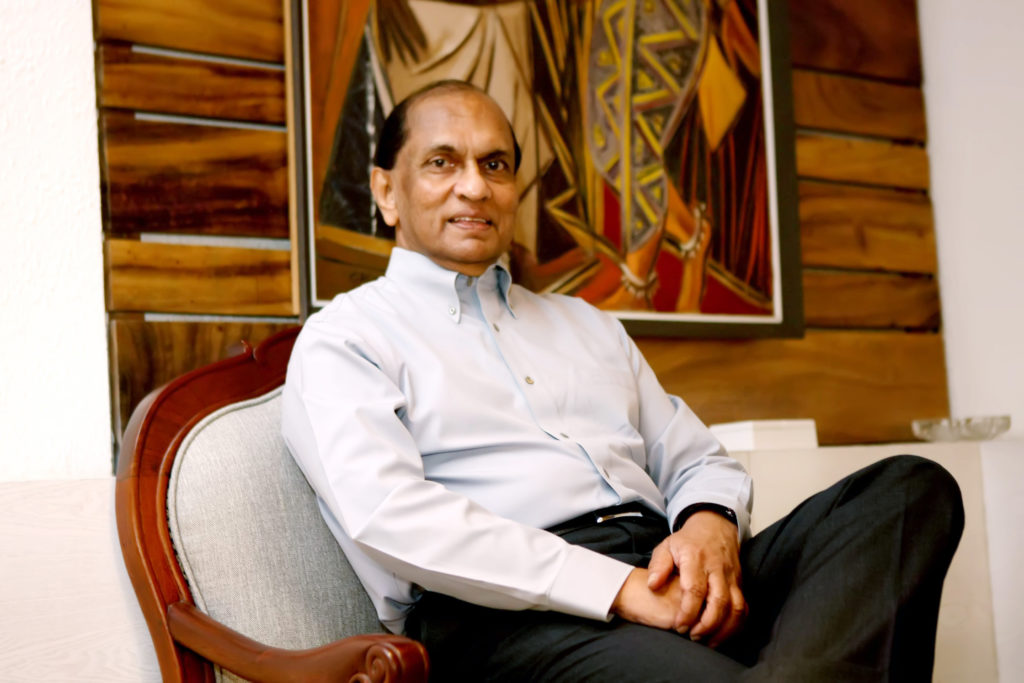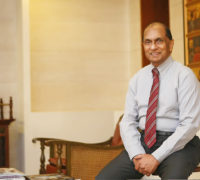
Ronnie Peiris needs no introduction; counting over four decades in the field of management, he has been a highly visible and influential leader in the corporate field. I managed to secure him for a Q&A session for this issue of Esteem that navigates not just his illustrious career, but also a set of diverse views on various topics.
Spending over four decades in senior management is no mean task. What has been the secret to enjoying such a long and consistent career?

Values, and traits developed by nature and nurture. The values developed by nature are those which were formed, and entrenched, because of parental influence and upbringing, schooling, religion and the visible practices of the overwhelming majority in society. The traits developed by nurture are those which were formed out of association, experiences, reading, television, entertainment, the society you move around in and bespoke training.
There are values that I will never compromise. Honesty and integrity are right at the top. Caring for fellow humans irrespective of their station in society, humility, simplicity, empathy and trust follow closely. Listening, delegating and empowering are traits, which I guess fall into the nurtured bucket. So is the relentless desire to achieve excellence in whatever I do and to delight whoever I serve. All of these within a framework of ethical behavior and in keeping with the laws and regulations in force. I firmly believe that doing the right thing brings its rewards in some form, shape or size.

I published a short book — “Tough Journey Great Destination”. It is an anecdotal illustration of the values and the traits, which founded my life, especially my corporate career. The book is available at Sarasavi Bookshops.
In a sense, nearly everyone I spoke to associates you with JKH. Tell us a bit about how you started out at JKH, and a list of achievements that you are most proud of.
I left Sri Lanka for greener pastures in December 1978. I returned in January 2003. I will be remiss if I did not acknowledge the formative exposure and experience I had, particularly in Management Accounting, at Lever Brothers (Ceylon) Limited as it was known then and the 25 years of multi-cultural experience I had, in a broad range of industries/functions, at Anglo American Corporation (Central Africa) Limited where I progressed from Accountant to Managing Director during the 25 years I worked for them.
I joined JKH as its Group Finance Director in January 2003 and was appointed to the Main Board in May 2003. I had wanted to return to Sri Lanka and was on the look out for suitable opportunities. The JKH opportunity fitted my aspirations and goals.

There were a couple of things, which struck me as systemic at JKH. The Top Management were very simple, humble persons with a “never say die attitude” and there was no compromise on honesty, integrity and ethics. These were in great alignment with my own values and traits and provided me an environment where I could apply my acquired knowledge, exposure and experience.
I was also fortunate to join JKH at a time when the Board had decided to review and revamp JKH’s Operating Model including the Board Operating Model. The Boston Consulting Group had been chosen as the Consultants. There were great expectations and excitement at JKH and I was blessed to join the Group at such a juncture.
In terms of achievement – there were many. But all were as a result of Team Effort. JKH is blessed to have the Leaders and Staff who are very performance oriented. Perhaps the achievement which gives me the greatest satisfaction is the establishment of a Finance and Accounting Team which I would say, unhesitatingly, is the Best in Sri Lanka. I call them the “All Blacks” of Finance and Accounting. Invincible. I was privileged to be at its helm during its transition from a function with a Compliance, Control and “Policeman-like” under-tone to one which is Advisory, Team-oriented, Open-minded and Futuristic. All this within a framework of professional independence, ethical behavior, honesty and integrity. As I stated earlier, it was Team Work and I was blessed to work with great women and men who have made the profession proud.
A key vehicle in JKH’s Operating Model is its very effective Performance Management System and I was a part of the Think-Tank, which conceptualized, designed and developed it. Since its initial implementation, we have reviewed and refined it in keeping with current and emerging trends. HR and Performance Management Systems are very much a part of my own DNA despite my “Finance and Accounting” beginnings.
It is also noteworthy that JKH has been recognized as the Most Respected Company in Sri Lanka in 12 of the 13 years since the inception of such an Award.
Your website www.ronniepeiris.com reveals that you have launched a book. Tell us how long it took you to write it, and what the writing process was like.
It is the current paucity of morals and values in our society and the diminishing awareness of professionalism which drove me to write this book. In this book, I have attempted to illustrate behavioural values and leadership principles through anecdotes from my life and my career. It is a very short book. Just 99 pages. Given the hectic pace of life and the declining reading habit, I deliberately kept it short. My target market is the young professional. So, I also kept it very affordable.
It is heartening to note that both the Generation “Y” and Generation “Z” are more socially conscious and more active in fighting for the “right” than the Generation “X”. I believe that the millennials will, with their greater “activism”, help rejuvenate the morality and values which are essential, in my view, for our country to prosper. A country which will provide all her citizens a better quality of life. The book aims at that too.
Since the thoughts came from my heart it was not too difficult to turn them into words nor was it a great burden in terms of time. I reflected on the contents for about 6 weeks in October/November 2016. Started writing in mid – January 2017 and completed the writing in August 2017. I must acknowledge, the advice, enthusiasm and perseverance of my Editor, Ms. Namini Wijedasa, who was very instrumental in advising me on the writing style. My natural writing style is very formal and business like. Namini persuaded me to adopt a more “from the heart” style of communication. I am very happy in how it turned out. Going by the reviews and public comments, it appears that the Readers are happy too.
What is one characteristic that you believe every leader should possess?
Leaders must be “SELFLESS”. It is my view that a Selfish person can never become an effective Leader. The checks and balances in a large Corporate setting, makes it difficult for a Leader to be Selfish and yet be effective. The culture and the broader employee population will catch up with him in due course. In smaller Corporate settings, a Selfish Leader may get away for a short time, but the sentiments of his followers will eventually catch up.
Just look at our Political scene. When can we say that we last had a Selfless Leader. In recent times, most policy decisions, at the highest governmental levels, are aimed at staying in power. They are not aimed at making our Country better. Everyone is looking for cheap popularity. Popularity to win an election and remain in power. They are not bothered about the future of this Country.
A professional’s pecking order of loyalty, and therefore accountability is first the public/society, second the profession, third the employer/client and lastly himself. If only such a code was practiced by our Leaders. What a difference it would make.
The Millennial generation is fast becoming the generation with the most about of workers globally. In the background of the habits and behaviours of this particular generation plus the fast advancement in technology (think social media), what would you say are the biggest challenges facing leaders today?
I will use some of my thoughts I shared recently with a very popular business newspaper in responding to this question. We must first take cognisance of the divergent perspectives, and attitudes, of generations, these being — “Baby Boomers 2” (born between 1955 and 1965), Gen “X” (born between 1966 and 1976), Gen “Y” (born between 1977 and 1994) and Gen “Z” (born between 1995 and 2012). It is rather obvious that relations among the generations are at a low point. Gen Y thinks Gen X is a bunch of whiners. Gen X sees Gen Y as arrogant and entitled. And everyone thinks the Baby Boomers 2 are self-absorbed workaholics. Baby Boomers 2 feel “younger people” do not have as strong a work ethic as they do. Gen X believe the “younger generation” lacks a good work ethic and that this is a growing problem. And Gen Y says the difference in work ethics across the generations is causing friction. They believe they have a good work ethic for which they are not given credit. There is little debate that the Gen “Y” s and the Gen “Z” s are more adept and familiar with the contemporary communication modes and technology platforms which have led, and are leading, to disruptive innovation. The Baby Boomers 2 and Gen X are of the view that technology-facilitated communication lack feeling and is open for misunderstanding and must therefore be used sparingly.
As a generalisation, and empirically, I reckon that most of the top leadership spots in the corporate world, particularly the corporate world in Sri Lanka, are occupied by Baby Boomers 2 and Gen X persons. The challenge for the Sri Lankan corporate leaders is to retain and recruit the talent it needs to replace the Baby Boomers 2 who will retire shortly and the Gen X persons who are likely to move up the organisational hierarchy. The new entrants and replacers are likely to be Gen Y-ers and Gen Z-s. In addressing the workforce needs of the present and the future, Leaders must recognise the generational differences, and aspirations, in facilitating collaborative work.
Whilst, many of my generation may not agree with me and that is based on conversations I’ve had with them, I believe that the quality of millennial talent, which is available to, and entering, the corporate world is appropriate, and relevant, to the current and emerging needs. They are educated and technologically more adept than those from previous generations. More specialists are emerging.
Speaking about Talent Management – Very often, when you ask CEO’s and CHRO’s what their key priorities are for the coming year, talent management always is one of the issues high on the list. Talent management is an easy and safe choice. Nobody will argue that talent management is not important. Supervisory Boards love to talk about succession and talent management. Talent management is generally seen as something long-term. When you hear terms as “strategic”, “long-term”, “future” and “investment”, you must be careful. For talent management, this means: it is important, but not urgent.
For the CEO, it means: I have ticked the box, but now HR can deal with it. Also, it does not affect my short-term performance indicators and incentives. “Of course, I will visit the final session of the senior management program, of course, I will personally mentor one or two high potentials, but please, do not bother me too much about talent management, I have more urgent matters on my plate”. This is what one hears frequently. A big challenge for organisations is to make talent management urgent, and to make it a priority of today, not of the future.
What is one mistake you witness leaders making more frequently than others?
Not “walking the talk”. This is a sure recipe for a loss of credibility. There is no Leader if he has no Followers. And Followers look for consistency and credibility. In the modern era, you just can’t fool all the people all the time. Although one could argue that most of the Sri Lankan voters get fooled most of the time.
Traits, I suppose, could affect careers. With this in mind, what is the one behaviour or trait that you have seen derail more leaders’ careers?
The reluctance to Delegate. Not just Delegate, but Delegate in an environment of Trust and Empowerment. Although you have asked for just one, let me give you another. That is the lack of Humility. Very normal persons become very pompous as they go up the ladder.
Suggest a few resources you would recommend to an aspiring Leader
Follow Role Models. Watch TV. Read extensively on Leadership. Subject yourself to Leadership Coaching.
What advice would you give someone going into a leadership position for the first time?
Don’t compromise on your Values under any circumstance. Practice Honesty and Integrity always. Be Transparent in everything you do. Lead from the front. BE SELFLESS.















